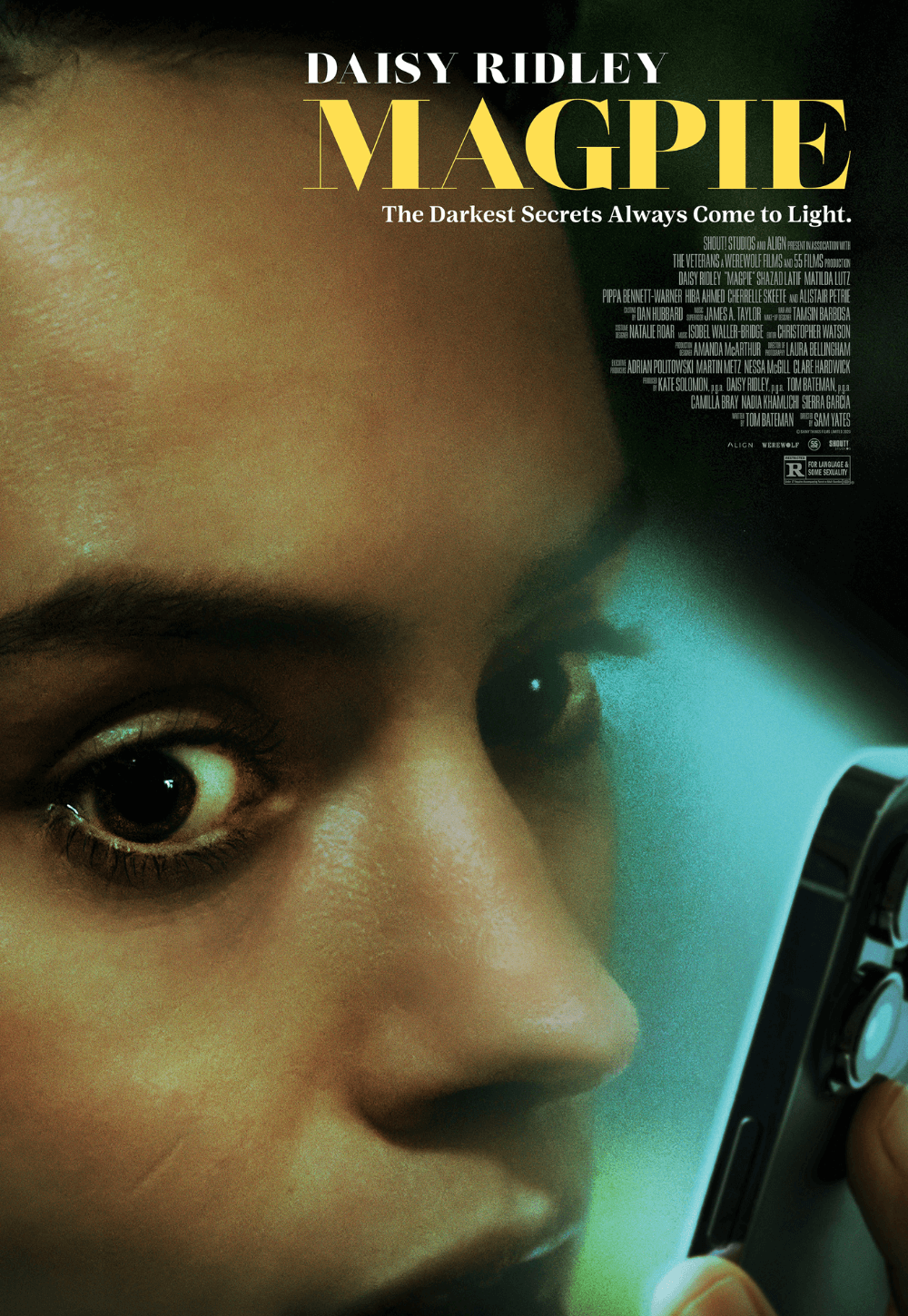
Magpie
By Brian Eggert |
Note: This film was screened for the Twin Cities Film Fest. It will open in theaters via Shout! Studios on October 25, 2024.
Gioachino Rossini’s nineteenth-century opera The Thieving Magpie tells the story of a housemaid set to be executed after her employers discover some silver missing. She’s taken to the gallows, and just before the trap door is released, the true culprit is revealed: a magpie bird that has nested in a church tower amid the silver it took to decorate its home. Magpies have earned a reputation, albeit exaggerated in light of the opera, for stealing shiny objects that attract them. However, several characters could be considered guilty of stealing in the domestic thriller Magpie. The most apparent theft is of one’s heart, with writer Ben (Shazad Latif) becoming fixated on a celebrity actress. But that’s not so much a theft as a desperate offering by a man in midlife crisis mode. Also in crisis is Anette (Daisy Ridley), who grapples with depression and suspects Ben of infidelity with the controversial performer. The movie comes equipped with a twist that undoubtedly gave Magpie its title, but unlike Rossini’s opera, the act of theft isn’t much of a shocker.
Based on an idea hatched by Ridley, the screenplay was written by her spouse, Tom Bateman. (In addition to being married, they share a connection with Kenneth Branagh, having both appeared in 2017’s Murder on the Orient Express, where they met.) The story opens when Anette and Ben’s young daughter Matilda (Hiba Ahmed) lands her first major acting role opposite Alicia (Matilda Lutz), a famous Italian actress making headlines because some of her private videos were hacked and released online. With Ben taking Matilda to the production’s set and Anette at home with their newborn, slowly unraveling from an already fraught marriage, tensions rise when the starstruck Ben finds himself drawn to Alicia, who flatters his writing with polite praise that he accepts in earnest. He stands up for the actress at a crucial point when the crew is caught watching her leaked video, and he parrots the moral reprimand that Anette gave him when he was watching the video and judging the actress. “What if that was your wife or daughter?”
While Bateman’s script gradually reveals more about Anette and Ben’s backstory and the source of their marital discord, several scenes shake our trust in Anette’s mental state—such as an early sequence in front of a mirror, where pressure mounts until a shattering outburst. She could be suffering from postpartum depression, particularly given a scene where Anette sprints into the yard with a baby monitor until the signal is lost and the sound of her newborn crying fizzles into silence. Her struggle with motherhood, a theme that seldom gets addressed in movies with any seriousness, is compounded by more circumstantial factors. This is especially true given what we learn about Ben’s past behavior, and Anette’s understandable concern when he appears on a celebrity gossip site, mistakenly rumored to be Alicia’s new alleged beau. After that, rather than protect his wife, Ben whines to Alicia that “my wife barely notices me” and doesn’t resist hugging her, despite the possibility that they will be photographed together again. Then, the two begin sharing intimate texts, hinting at an affair on the horizon.
Coming to Magpie with a vast background in classical British theater and television, director Sam Yates makes his feature debut with a narrative depicted through crisp but subtle camera movements. While Isobel Waller-Bridge’s leisurely score implants an ominous mood, the digital lensing by cinematographer Laura Bellingham is chilly and removed but strategic in its maneuvers, like a domestic David Fincher movie. Still, the aesthetic presentation plays a recessive, almost invisible role in supporting the story and the actors, aside from some imaginative dreamlike sequences where Ben imagines Alicia texting him. Ridley gives a strong performance as a rightfully suspicious woman questioning her irritable partner, who doesn’t concern himself with his wife’s feelings and would prefer to sneak off to the bathroom and jerk off to Alicia’s video. When questioned, he’s resentful and mean, gaslighting his wife with lies and excuses, which become increasingly embarrassing (for him).
While confidently acted, Magpie hinges on a reveal, coupled with a clunky flashback ending that shows the viewer what was really going on—a movie cliché that is seldom done well. This is no exception. The twist isn’t all that surprising or unpredictable, and it’s followed by a scene of violence that feels like overly convenient poetic justice—as though every emotional indiscretion must receive a physical punishment of equal force. The twist and physical comeuppance don’t add to the viewer’s enjoyment; they only emphasize how undercooked this low-grade thriller is, like a less erotic and tense version of an Adrian Lyne film. Ridley and Bateman’s underwhelming story might have been more effective as a simple domestic drama rather than a would-be thriller armed with a gotcha moment. Apart from well-calibrated performances from Ridley and Latif, Magpie feels like a plain and straightforward psychological drama with more panache, chilly style, and build-up than the material deserves.

Consider Supporting Deep Focus Review
I hope you’re enjoying the independent film criticism on Deep Focus Review. Whether you’re a regular reader or just occasionally stop by, please consider supporting Deep Focus Review on Patreon or making a donation. Since 2007, my critical analysis and in-depth reviews have been free from outside influence. Becoming a Patron gives you access to exclusive reviews and essays before anyone else, and you’ll also be a member of a vibrant community of movie lovers. Plus, your contributions help me maintain the site, access research materials, and ensure Deep Focus Review keeps going strong.
If you enjoy my work, please consider joining me on Patreon or showing your support in other ways.
Thank you for your readership!
Brian Eggert | Critic, Founder
Deep Focus Review







